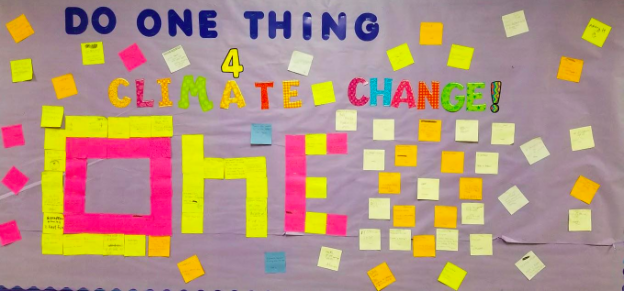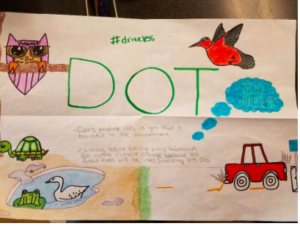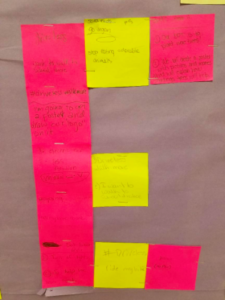The Nisqually River Education Project, South Sound GREEN and Chehalis Basin Education Consortium are offering the first ever Climate Resiliency Fellows. This program aims to build a dynamic community of engaged teachers committed to engaging their students in learning about and taking action in local climate change issues and climate resiliency projects. The Fellows program is offered as a part of a 3 year, environmental literacy program supported by NOAA. Teachers in the program meet quarterly to receive curriculum support and brainstorm ideas for action projects that address local issues. Dave Sanford is a teacher at Nisqually Middle School and one of our Fellows participating this year. Here, he reflects on his students’ experiences with the Do One Thing campaign. Thank you, Becky, for a great blog!
Describe how you implemented a tree planting or habitat restoration action project with your class.
I implemented a personal action project with my students. The personal action was to Do One Thing to reduce the effects of climate change. My students have been studying how humans have been affecting Puget Sound. Together we have learned about the policies in Puget Sound around transporting oil. My students also learned about the intricacies of oil spill response and practiced their hand at oil spill response in a model simulation. My students also engaged in a debate about sources of electrical energy by researching multiple energy sourced and having a debate about the merits and drawbacks of each energy source. After these projects students watched sections of the “our climate our future” presentation by the Alliance for Climate Education. I then asked my students to identify one thing that they could do in their lives to help prevent the negative effects of anthropogenic climate change. They wrote their initial responses onto post it notes, that we used to make a collage in the hallway leading to the classroom. Then the students made posters, videos, mems or blogposts to communicate their one thing and how it will help reduce the effects of climate change. Thay are sharing these projects in the school and on social media.
How did it augment what you were teaching in your class?
This project helped give my students a personal connection to the lessons and their lives. This action project continued the work that my students had been developing and augmented what we were doing in class by giving students an opportunity to take action and seek out possible change. This project also gave students the opportunity to connect their learnings around ecosystems, global systems, chemistry and physics in a tangible way that many of them feel strongly about.
Did you experience any challenges with your action project?
When I do this project again I would like to develop a way to revisit their goals. What was their one thing and how have they done in implementing the change that they hoped to accomplish? I would like to help them calculate their carbon savings and take a momne to look at the impact that they have made.
Describe a memorable moment of the experience. It could be something funny that happened, a student’s reaction, or anything that stood out to you during your action project.
I have had many memorable moments during this experience. One that resonates with me is when two students approached me after class and showed me a notebook that they planned to fill with climate change information, data, and the effects of climate change. They wanted to fill a notebook with data and arguments to share with other people that were unconvinced of climate change science. These students are planning to visit all of the science classes and share their learning. These students are also discussing starting a green club at our school and recruiting other students to join a group of citizen scientists.
Call to action. What would you tell the reader to do next? Whether they are another teacher, student, or community member, how could they take action in their own lives to be more climate resilient after reading your blog post?
Fellow educators, students, citizens, friends. I implore you. Start somewhere. Do ONE thing. This journey for me has built on itself. Early in it I was unconvinced that my students would be motivated by the data. I was wrong. They are inspired by the data. Many of them are encouraged and excited. Even if you can only squeeze your minimum into a lesson on occasion. Start somewhere, You might be amazed with what happens next.


